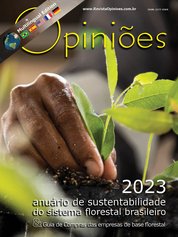Antonio Joaquim de Oliveira
Diretor Executivo da Dexco e Presidente do Conselho Deliberativo da Indústria Brasileira de Árvores
AsCP23
Sustentabilidade: caminho para a perenidade
Vivemos em um mundo de constantes transformações. As mudanças climáticas, os conflitos geográficos, a crise de biodiversidade e as oscilações da economia global são exemplos dos desafios que têm sido impostos à sociedade. Ainda que as causas e possíveis soluções para esses problemas sejam amplas e complexas, é inegável que parte das respostas passa pelas empresas, uma vez que também experimentam, em variadas escalas, os impactos dessa realidade.
Nesse contexto, nas organizações que buscam a perenidade de seus negócios, as discussões sobre sustentabilidade precisaram deixar de ser assunto de alguns poucos técnicos e passaram a fazer parte da estratégia de suas operações. À medida que o conceito de governança ambiental, social e corporativo vai se tornando mais presente nas companhias, suas partes interessadas esperam uma governança de questões ambientais e sociais cada vez mais aprimorada. Essa percepção do aumento de expectativas se corrobora com a régua cada vez mais alta de índices de sustentabilidade, padrões de certificação e novas legislações.
Um tema que tem recebido especial atenção é a forma com que as empresas têm enfrentado as mudanças climáticas; tanto ao minimizar seus impactos e fazer a transição para uma economia de baixo carbono, quanto no entendimento da exposição de seus negócios aos riscos trazidos pelas alterações do clima, ao mensurar seu potencial impacto e ao estabelecer planos de ação para atenuar suas consequências.
Por contribuírem naturalmente para a remoção de dióxido de carbono da atmosfera, as plantações florestais e as florestas naturais têm papel fundamental no combate às mudanças climáticas. Além disso, o longo histórico de programas de melhoramento desenvolvidos pelas empresas florestais e o conhecimento produzido em universidades e instituições de pesquisa fornecem a perícia necessária para o desenvolvimento de materiais genéticos que sejam capazes de se adaptar às diferentes condições climáticas.
O setor florestal brasileiro tem papel de destaque na gestão e cuidados com a biodiversidade, contribuindo atualmente para a conservação de mais de 6 milhões de hectares de vegetação nativa, segundo dados da Indústria Brasileira de Árvore. À luz do Marco Global da Biodiversidade, aprovado no final de 2022, as empresas serão progressivamente mais demandadas a identificar e divulgar seus impactos e dependências da biodiversidade. Iniciativas globais como a Iniciativa Global de Informação e a Força-tarefa sobre Divulgações Financeiras Relacionadas à Natureza, já se mostram como possíveis formas de sistematizar o formato desses reportes, ainda que a complexidade para definir indicadores comparáveis entre setores seja um desafio para sua implementação.
Outro vetor de mudanças é o surgimento de novos requisitos legais, que pode ser exemplificado com a recente publicação da nova regulação europeia contra o desmatamento, o Regulamento para Produtos Livres de Desmatamento. Ao exigir dos importadores europeus medidas de diligência para assegurar que produtos provenientes das cadeias de sete mercadorias, uma delas a madeira, não tenham sido obtidos de áreas desmatadas após 2020; independentemente se de forma legal ou ilegal, aumenta-se o nível de responsabilidade dos produtores para garantir a rastreabilidade até o local de origem da matéria-prima.
Ainda que à primeira vista essa regulação impacte apenas as exportações diretas para a União Europeia, seus efeitos podem cascatear pela cadeia de valor. Por exemplo, um fabricante que exporte móveis de Placa de fibra de média densidade para a Europa precisará garantir rastreabilidade dos painéis utilizados até a sua floresta de origem, envolvendo mais elos da cadeia produtiva.
Nesse sentido, o setor florestal novamente possui um diferencial que pode contribuir para o atendimento destes requisitos: certificações de manejo florestal e cadeia de custódia. Desde 1995, quando o primeiro certificado foi emitido no Brasil, as empresas têm demonstrado e ampliado seus compromissos com práticas de manejo que sejam ambientalmente corretas, socialmente benéficas e economicamente viáveis e têm implantado medidas de controle para evitar que a madeira proveniente de fontes controversas seja utilizada em seus processos produtivos.
Esses são alguns exemplos que reforçam a importância de se incorporar questões de sustentabilidade à estratégia dos negócios. Evoluir é necessário. As organizações que se recusam a fazer essa mudança de pensamento podem estar colocando em risco sua própria existência no futuro.




